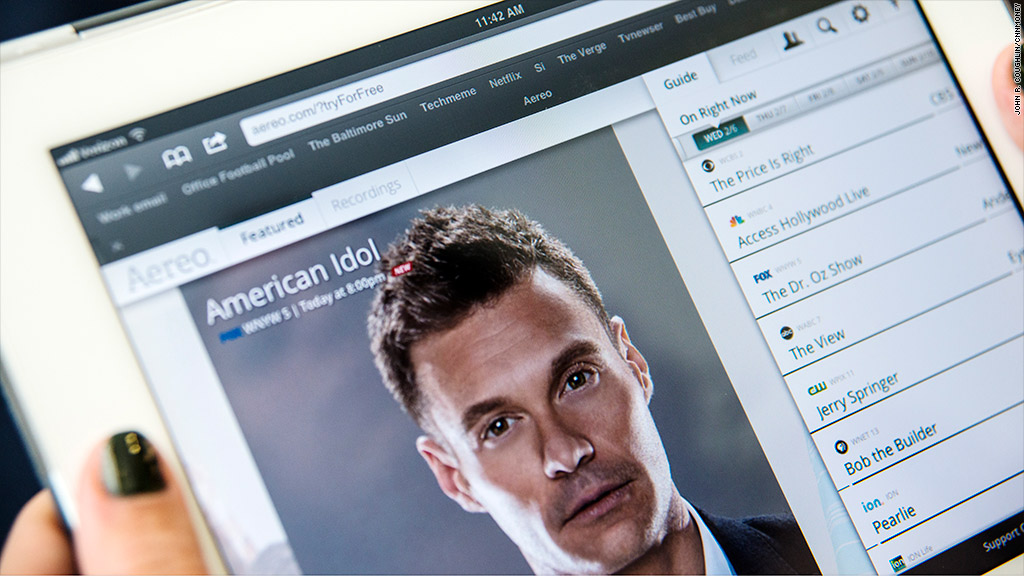
The high-stakes legal battle over Aereo, a startup that lets users stream or record live broadcast TV content, has reached the highest court in the land.
The Supreme Court said Friday that it would hear the major broadcasters' challenge to Aereo, which launched in 2012 to great controversy in the media industry.
At the heart of the controversy is Aereo's lack of authorization from broadcasters -- and whether the startup legally needs that approval.
Aereo houses thousands of tiny antennas in its data centers, and it assigns each customer a unique antenna. Aereo argues that this method works like the perfectly legal antennas and DVRs that anyone can buy off the shelf.
But broadcasters say that this is an unfair dodge, and they have filed a series of lawsuits to stop Aereo in its tracks. They argue Aereo should have to pay them to retransmit their programming, just like cable and satellite providers do.
The networks originally filed their petition to the Supreme Court in October, asking the high court to hear the case. In December, Aereo said it would not fight that effort, and the company added it wanted the case "resolved on the merits."
Services like Aereo gravely undermine the business model for local broadcasters. If the Supreme Court finds Aereo to be operating legally, as most lower court rulings have so far, then big cable and satellite companies that currently pay hefty retransmission fees might stop paying and set up Aereo-like systems instead.
In fact, some distributors have already held talks with Aereo about possible partnerships.
"We look forward to having our day in court," said CBS (CBS), one of the plaintiffs in the case. "We believe that Aereo's business model, and similar offerings that operate on the same principle, are built on stealing the creative content of others."
Aereo, in a statement of its own, sought to frame the case as one about consumer access to innovative technology: "We have every confidence that the Court will validate and preserve a consumer's right to access local over-the-air television with an individual antenna, make a personal recording with a DVR, and watch that recording on a device of their choice."
Related story: CNNMoney reviews Aereo
Chet Kanojia, Aereo's CEO, added: "The broadcasters are asking the Court to deny consumers the ability to use the cloud to access a more modern-day television antenna and DVR. If the broadcasters succeed, the consequences to consumers and the cloud industry are chilling."
SCOTUSBlog, the Web site dedicated to coverage of the high court, said the case will probably will be argued in April, "the last sitting of the term."
Aereo launched on Valentine's Day 2012. at a splashy press event in New York, helmed by Kanojia and one of his investors, former Fox network president and current IAC (IACI) chief Barry Diller.
Diller said the service "pries over-the-air broadcast television out of that closed system" of cable and satellite distribution. He hinted that Aereo could someday deliver a wide range of television shows -- not just local stations -- to subscribers via the Internet, rivaling cable companies like Comcast.
Shortly after Aereo launched in its first market, New York City, the owners of most of the country's major broadcasters --including ABC (DIS), CBS, Fox, and NBC (CMCSA) -- filed copyright infringement lawsuits.
The legal action continued as Aereo expanded to new cities like Boston. But courts have mostly sided with Aereo, leading to the broadcasters' appeal to the Supreme Court.
The debate over retransmission fees bubbles up frequently in the TV industry, as it's typically at the crux of battles between cable companies and broadcasters. Time Warner Cable (TWC) households in New York and Los Angeles lost CBS programming for most of the month of August due to a retransmission feud; the cable company later said that some of the 306,000 subscribers it lost during the summer fled due to that blackout.
Several content creators have joined the fray. In November, the NFL and MLB filed a legal brief to the Supreme Court in support of the broadcasters' case, saying Aereo could cause them to stop airing games on free TV.
Twenty-First Century Fox (FOX) made a similar threat in April, saying it would make Fox a pay-TV channel if Aereo stays in business.
Rich Greenfield, an analyst at BTIG Capital who has taken Aereo's side in the dispute, predicted on Friday that Aereo's prior court victories would be affirmed by the highest court.
"Every American has the legal right to buy and use an antenna, personal recording device and a slingbox to enable remote viewing," Greenfield said in an email. "The Supreme Court will now decide whether that same equipment/technology can be leased/rented to consumers, while at the same time delivering a decision that has wide-ranging implications for the future of cloud computing in this country."
Greenfield added: "This is the biggest media case in front of the Supreme Court since Sony Betamax. I can't wait to hear oral arguments."

